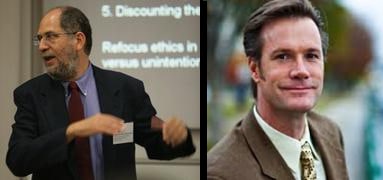
“Impact: Where Business and Ethics Meet,” a podcast developed by the Carnegie Council, examines the evolution of global business and related ethical questions, allowing listeners from all sectors to make purposeful decisions.
Ethical Systems collaborators were featured in the April, May, and June 2015 episodes, available below.
| Collaborators | Topic | Air Date |
|
|
Cheating and Dishonesty Cheating, misconduct, deception and other forms of unethical behavior are widespread today, not just in business but in sports, government, schools, and many other arenas. While the media often focuses on extreme cases, less attention is paid to what researchers call “ordinary unethical behavior.” These forms of unethical behavior are often the results of ordinary people giving in to the temptation to cheat when confronted with the opportunity to do so. When combined, these behaviors are extremely costly for both businesses and society. This podcast will seek to provide answers to:
|
June 8
|
|
|
Negotiation Negotiation is a “mixed motive” interaction – negotiating parties will be motivated both to cooperate (creating value) and compete (claiming value). Additionally, most negotiations are characterized by information asymmetries. As a result, deception is pervasive and many ethical questions are raised, including:
|
May 14
|
|
Jonathan Haidt and Ann Tenbrunsel
|
Ethical Systems Design
When it comes to ethics in the workplace, the behavioral sciences offers employees and companies many tools and resources to improve their internal culture and deepen ethical behavior. Some companies, especially in the wake of the 2008 financial crisis, are looking to encourage this through “ethical systems design,” by setting up incentives that encourage employees to make principled decisions.
This episode introduces important questions, including:
|
April 14
|



